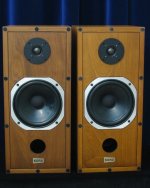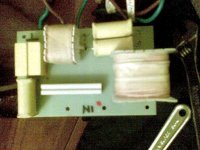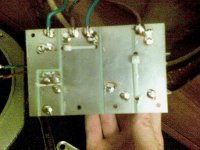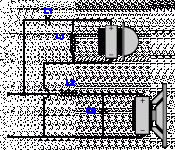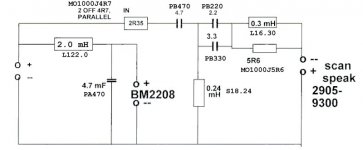Hi, been looking to improve my ATC SCM-7's and came across these, after being interested in a Volt Bass driver based speaker for quite some time now.
Got them home and they are not too bad. Treble detail is especially good, very smooth, accurate and clean! But it lacks midrange and the two drivers dont seem to integrate together.
The original speaker is called 'Kord Tornado', i believe that they were studio styel mid-field monitors from the late 80's (i guess).
They came with the Volt BM220 'DS' version and a Scan Speak D2008/8512, it was 'up graded' by the previous owner to a Scan Speak D2905/9300.
I dont think that the crossover has been changed. The enclosure seems to be around 32 Litres, and using the BM220.8 as a model, tuned to 36Hz with F3-35Hz.
Looking around, it seems that the SS D2905/9300 has been paired with the Volt BM220.8 in the Wilmslow Audio HSM and the Solen HSM kits.
Would these crossovers be a better starting point?
Does anyone know the differences between the older BM220DS model and the newer BM220.8 model?
Thanks, Rob 🙂
Got them home and they are not too bad. Treble detail is especially good, very smooth, accurate and clean! But it lacks midrange and the two drivers dont seem to integrate together.
The original speaker is called 'Kord Tornado', i believe that they were studio styel mid-field monitors from the late 80's (i guess).
They came with the Volt BM220 'DS' version and a Scan Speak D2008/8512, it was 'up graded' by the previous owner to a Scan Speak D2905/9300.
I dont think that the crossover has been changed. The enclosure seems to be around 32 Litres, and using the BM220.8 as a model, tuned to 36Hz with F3-35Hz.
Looking around, it seems that the SS D2905/9300 has been paired with the Volt BM220.8 in the Wilmslow Audio HSM and the Solen HSM kits.
Would these crossovers be a better starting point?
Does anyone know the differences between the older BM220DS model and the newer BM220.8 model?
Thanks, Rob 🙂
Attachments
Last edited:
Here is a picture of the crossover, cant seem to work out the schematic 😕
The bottom shows the connections (rotated and flipped) 😱
I believe that it shows the tweeter out of phase? so should it be wired at the tweeter in or out of phase?
The bottom shows the connections (rotated and flipped) 😱
I believe that it shows the tweeter out of phase? so should it be wired at the tweeter in or out of phase?
Attachments
Last edited:
Hi Rob. It's a type 2Way 2nd order xover with a resistor before C1 on tweeter. I don't know what is after C1 (box/rele? look alike, can't see). The phase is very much related with distance in the front baffle between drivers and xover frequency. It can be one or the other. Sometime ago we were checking this same problem in another manufacturer (ATC?) with both connections or different setups.
Attachments
C1 = 2u2 (2.2uf??)
L1/L2 = not marked
C2 = 2x 2u2 (2.2uf??)
R = 2r2 (2.2 Ohms??)
After C1 it goes to the coil and 2x 3.3uf capacitors.
On the crossover, the right hand side is the mid/bass and the left is the tweeter
I was asking about the phase as when the tweeter was changed, not sure if the has tweeter polarity has been changed, would this cause the midrange suck out?
L1/L2 = not marked
C2 = 2x 2u2 (2.2uf??)
R = 2r2 (2.2 Ohms??)
After C1 it goes to the coil and 2x 3.3uf capacitors.
On the crossover, the right hand side is the mid/bass and the left is the tweeter
I was asking about the phase as when the tweeter was changed, not sure if the has tweeter polarity has been changed, would this cause the midrange suck out?
Last edited:
Cheers, so i think this is right then.... (just dont know the values of the coils)
It does not look like there is any baffle step compensation, even considering the bass i well balanced...
An externally hosted image should be here but it was not working when we last tested it.
It does not look like there is any baffle step compensation, even considering the bass i well balanced...
Yes, 3rd Order on tweeter. (I can see now the inductor/cooper on the side of the double caps, that looked like a "box")
Your xover should be fine, with inverted phase on tweeter.
C2 = 2x 2uF2 parallel =4.4uFC2 = 2x 2u2 (2.2uf??)
Your xover should be fine, with inverted phase on tweeter.
C3 = 2x 3uF3 parallel =6.6uFAfter C1 it goes to the coil and 2x 3.3uf capacitors.
Last edited:
You don't know, but it should be integrated with the 2.Order xover. You just can't "see" it. Maybe a bigger coil.😉It does not look like there is any baffle step compensation, even considering the bass i well balanced...
Ah ok, just had a look at the other crossover, the two 3.3uf have been replaced with a single 6.0mfd cap. Will that make a huge difference?
The main problem is that with the ATC's (xover @ 2.8Khz) you could hear voices coming out of the mid/bass driver which gave vocals weight, on these all the vocals come out of the tweeter, and looking on the web, the xover seems to be in the simmilar area (2.5-3.0Khz) using the capacitor values on a second order network. Hence the lack of integration between the drivers, and the lower midrange suck out.
The main problem is that with the ATC's (xover @ 2.8Khz) you could hear voices coming out of the mid/bass driver which gave vocals weight, on these all the vocals come out of the tweeter, and looking on the web, the xover seems to be in the simmilar area (2.5-3.0Khz) using the capacitor values on a second order network. Hence the lack of integration between the drivers, and the lower midrange suck out.
Last edited:
No. That's small adjustments, from repairs or components tolerances.Ah ok, just had a look at the other crossover, the two 3.3uf have been replaced with a single 6.0mfd cap. Will that make a huge difference?
Yes, again. You must be right (if you say so). Somewhat the C1 cap of 2.2uF is fishy to me, unless was tested that way (with another tweeter?).The main problem is that with the ATC's (xover @ 2.8Khz) you could hear voices coming out of the mid/bass driver which gave vocals weight, on these all the vocals come out of the tweeter, and looking on the web, the xover seems to be in the simmilar area (2.5-3.0Khz) using the capacitor values on a second order network. Hence the lack of integration between the drivers, and the lower midrange suck out.
If you want to go trough the pain change xovers or test new implementations from scratch.
We have:
Volt BM220.8 (Volt BM220 'DS' version is used, is it the same/similar?).
Scan Speak D2905/9300 https://www.madisound.com/store/product_info.php?products_id=910
You go to this xover that is used with similar drivers
Design of the Month
Or if you start with a new (different) approach. This xover (second order) also might work but is for another, not very different driver ScanSpeak 18W/8545
SpeakerBuilding.com - Making of M1 - Print
Good luck Rob.
I would like to add this as reference, when people ask if they should use sealed or BR.
http://www.pinkfishmedia.net/forum/archive/index.php/t-26358.html
Attachments
Last edited:
Yes, i had seen both the Solen HSM kit and the old Wilmslow Audio HSM kit use both the SS 9205/9300 and the Volt BM220.8, they are also 3rd order on the tweeter and 2nd order on the bass, and both around 33L cabinet design as well. I have fired off an email asking if they know of the differences between the older BM220'DS' and the newer BM220.8 and if the crossover design would be suitable.
Thanks again, Rob
Thanks again, Rob
Always having in mind that, besides the driving units, are also important (as Peter Comeau listed in 2007),
Baffle step
Cabinet and driver unit reflections and interference
Drive unit spacing
Enclosure performance (both internal and external)
Phase and time arrival.
Volt might be able to send you the specs for the vintage driver, if they were not sold to China for recycling.
Baffle step
Cabinet and driver unit reflections and interference
Drive unit spacing
Enclosure performance (both internal and external)
Phase and time arrival.
Volt might be able to send you the specs for the vintage driver, if they were not sold to China for recycling.
- Status
- Not open for further replies.
- Home
- Loudspeakers
- Multi-Way
- Volt BM220DS + D2905/9300 - Kord Tornado
